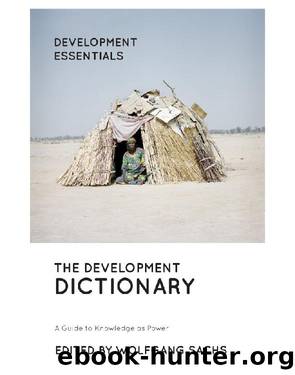The Development Dictionary by Unknown

Author:Unknown
Language: eng
Format: epub
ISBN: 9781786997524
Publisher: Book Network Int'l Limited trading as NBN International (NBNi)
Published: 2019-07-14T16:00:00+00:00
The impact of many development programmes has been particularly negative on women and indigenous peoples, as development projects appropriate or destroy their basis for sustenance and survival. Historically, Western discourse has refused to recognize the productive and creative role of women, and this refusal has contributed to propagating divisions of labour that keep women in positions of subordination. For planners and economists, women were not, until recently, ‘economically active’, despite the fact that a great share of the food consumed in the Third World is grown by women. Moreover, women’s economic and gender position frequently deteriorated in the 1970s as a result of the participation in rural development programmes by male heads of household. It is not surprising that women have opposed much more actively than men these rural development programmes. With the ‘technological packages’, specialization in the production of certain crops, rigid lay-out of fields, preset cultivation routines, production for the market, and so forth, they contrast sharply with the more ecological and varied peasant farming defended by women in many parts of the Third World – in which production for subsistence and for the market are carefully balanced. Unfortunately, the recent trend towards incorporating women into development has resulted for the most part in their being targeted for what in all other respects remain conventional programmes. ‘Target group categories are constructed to further development agency procedures to organize, manage, regulate, enumerate and rule the lives of ordinary women.’10 Thus the development industry’s clientele has been conveniently doubled by this shift in representation.
Another important recent instance of planned development is the industrialization schemes in so-called free-trade zones in the Third World, where multinational corporations are brought in under very favourable conditions (e.g. tax breaks, assurances of cheap, docile labour and a ‘stable’ political climate, lower pollution standards, etc.). Like all other forms of planning, these industrialization projects involve much more than an economic transformation, and on an ever larger scale. What is at stake here is the rapid transformation of rural society and culture into the world of factory discipline and modern (Western) society. Brought into Third World countries in the name of development, and actively promoted and mediated by Third World states, the free-trade zones represent a microcosm in which households, villages, traditions, modern factories, governments and the world economy are all brought together in unequal relations of knowledge and power. It is no accident that most of the workers in the new factories are young women. The electronics industries in Southeast Asia, for instance, rely heavily on gender forms of subordination. The production of young women factory workers as ‘docile bodies’ through systematic forms of discipline in the factory and outside it does not go, however, without resistance, as Aihwa Ong shows in her excellent study of Malaysian women factory workers. Women’s forms of resistance in the factory (destruction of microchips, spirit possession, slowdowns, etc.) have to be seen as idioms of protest against labour discipline and male control in the new industrial situation. Moreover, they remind
Download
This site does not store any files on its server. We only index and link to content provided by other sites. Please contact the content providers to delete copyright contents if any and email us, we'll remove relevant links or contents immediately.
Kathy Andrews Collection by Kathy Andrews(10519)
The remains of the day by Kazuo Ishiguro(7551)
Spare by Prince Harry The Duke of Sussex(4195)
Paper Towns by Green John(4169)
The Body: A Guide for Occupants by Bill Bryson(3800)
Be in a Treehouse by Pete Nelson(3212)
Harry Potter and the Goblet Of Fire by J.K. Rowling(3045)
Goodbye Paradise(2962)
Never by Ken Follett(2880)
Into Thin Air by Jon Krakauer(2701)
The Remains of the Day by Kazuo Ishiguro(2617)
The Genius of Japanese Carpentry by Azby Brown(2609)
The Cellar by Natasha Preston(2595)
Drawing Shortcuts: Developing Quick Drawing Skills Using Today's Technology by Leggitt Jim(2532)
120 Days of Sodom by Marquis de Sade(2436)
Architecture 101 by Nicole Bridge(2350)
The Man Who Died Twice by Richard Osman(2298)
Machine Learning at Scale with H2O by Gregory Keys | David Whiting(2290)
Fairy Tale by Stephen King(2069)
